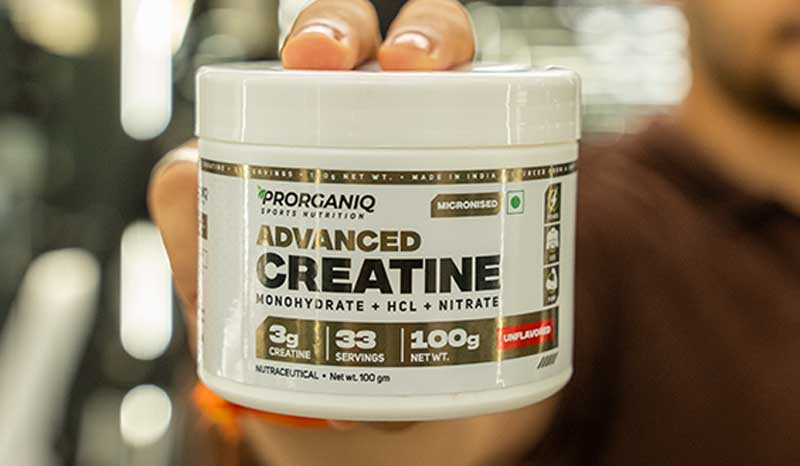Is Creatine Monohydrate Safe for Daily Use?
Creatine - In recent years, India has seen a remarkable surge in health awareness and gym culture.
People are becoming more conscious of their physical fitness, from metropolitan cities like Mumbai and Bangalore to smaller towns like Indore or Patna.
Alongside this boom in fitness enthusiasm comes an increased interest in sports supplements, and among them, creatine monohydrate often takes center stage.
But a pressing question remains in the minds of many: Is creatine monohydrate safe?
What is Creatine Monohydrate?
Creatine is a naturally occurring compound found in small amounts in animal-based foods like red meat and fish. The human body synthesizes it in the liver, kidneys, and pancreas.
Its main role? To help regenerate adenosine triphosphate (ATP), the energy currency of our cells, especially during high-intensity activities like weightlifting, sprinting, or even playing cricket.
Creatine monohydrate is the most researched and widely used form of creatine. It's a combination of creatine and a water molecule, offering maximum absorption and efficacy.
It usually comes in powder or capsule form and is often taken as a supplement by athletes and fitness enthusiasts to improve performance, strength, and muscle mass.
In India, creatine monohydrate is readily available in supplement stores, online platforms, and even gyms. Despite its widespread use, many are still skeptical about its safety.
Is Creatine Monohydrate Safe?
Yes, creatine monohydrate is safe for healthy individuals when used correctly and is one of the most researched sports supplements globally.
The safety of creatine monohydrate has been studied for decades. It is, in fact, one of the most researched supplements in the world.
Major health and nutrition organizations, including the International Society of Sports Nutrition (ISSN), consider creatine to be safe and effective when used appropriately.
A few key findings include
✔ Kidney Function: Long-term studies involving individuals taking creatine for up to five years have found no negative impact on kidney or liver function in healthy individuals.
✔ Hydration and Muscle Cramps: Contrary to popular belief, creatine doesn't cause dehydration or muscle cramps. It may help with thermoregulation and hydration.
✔ Mental Health Benefits: Some studies indicate that creatine supplementation may improve cognitive function and reduce symptoms of depression, especially in sleep-deprived individuals.
✔ Bone and Muscle Health: Older adults may also benefit from creatine in terms of improved muscle mass and bone density.
Common Myths Around Creatine in India
The Indian supplement market is still in its growing stages, and unfortunately, misinformation spreads faster than science.
Here are some common myths about creatine that need to be debunked:
✔️ Myth 1: Creatine damages the kidneys.
This is perhaps the most common concern. The truth? Numerous studies show that creatine is safe for healthy individuals.
Kidney issues only arise if someone already has pre-existing kidney disease. If you're healthy and stay hydrated, there's little to worry about.
✔️ Myth 2: Creatine is a steroid.
Steroids are synthetic hormones that can have severe side effects. Creatine, on the other hand, is a naturally occurring compound.
It is not a hormone and doesn’t act like one. Lumping creatine with steroids is like comparing protein powder to antibiotics, completely unrelated.
✔️ Myth 3: Creatine causes hair loss.
One small study suggested a link between creatine and increased levels of DHT (a hormone linked to hair loss), but no study has definitively proven that creatine causes hair loss.
Genetics plays a far bigger role in baldness than supplements do.
✔️ Myth 4: Creatine leads to bloating.
Some people may experience water retention during the loading phase, but this isn’t "bloating" in the digestive sense.
It's usually temporary and subcutaneous (under the skin) rather than in the stomach.
The key takeaway? Don’t let misinformation cloud your judgment. Always rely on peer-reviewed research and professional guidance.
How to Take Creatine Safely: Dosage and Best Practices?
If you're considering creatine monohydrate supplementation, doing it right is crucial.
✅ Loading Phase (Optional)
Some people choose to start with a loading phase of 20 grams per day (divided into 4 doses) for 5-7 days. This saturates your muscles with creatine quickly.
✅ Maintenance Phase
After the loading phase, a daily dose of 3-5 grams is sufficient. This can be continued for several months or even years without cycling off.
✅ Hydration
Creatine pulls water into your muscles, so staying well-hydrated is important. Aim for at least 3-4 liters of water per day.
✅ When to Take
It can be taken before or after workouts. Some evidence suggests post-workout may offer slightly better results due to increased insulin sensitivity.
✅ Mixing
Creatine is best taken with water or a carbohydrate-rich drink like fruit juice to enhance absorption.
Special Considerations for the Indian Population
When it comes to supplements, the Indian diet and lifestyle introduce some unique variables.
🌟 Vegetarianism
A significant portion of Indians follow a vegetarian or lacto-vegetarian diet, which means lower natural creatine intake.
🌟 Climate
India's hot and humid climate can increase water loss through sweat, which means creatine users should be extra careful about hydration.
🌟 Accessibility and Quality
Not all supplements in the Indian market are of equal quality. Some local brands may not undergo stringent quality checks.
🌟 Medical Consultation
Indians with dietary conditions like diabetes, high blood pressure, or kidney issues should consult a doctor before starting any supplement.
🌟 Age and Gender
Creatine is safe for both men and women above 18 years. However, pregnant or breastfeeding women should avoid it unless specifically recommended by a healthcare professional.
Final Verdict
For healthy individuals, creatine monohydrate is both safe and effective when taken in recommended doses.
It is not a shortcut to fitness but a scientifically backed aid that, when combined with a proper diet and exercise regimen, can help enhance performance, muscle mass, and recovery.
In the Indian context, creatine might even provide added advantages due to common dietary gaps, especially in vegetarian populations.
That said, it’s not a magic powder. Real results come from consistent effort in training and nutrition.
